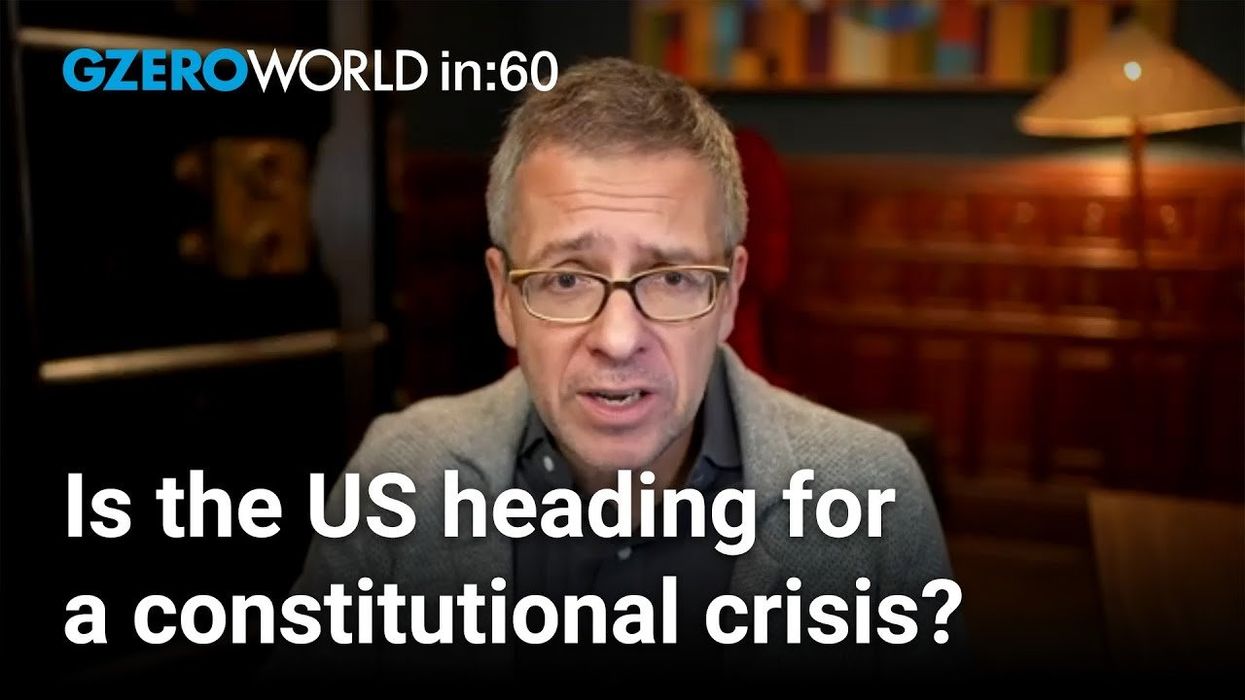VIDEOSGZERO World with Ian BremmerQuick TakePUPPET REGIMEIan ExplainsGZERO ReportsAsk IanGlobal Stage
Site Navigation
Search
Human content,
AI powered search.
Latest Stories
Start your day right!
Get latest updates and insights delivered to your inbox.
Will Biden's reversal to allow F-16s to Ukraine be a game-changer? What is holding up a debt ceiling deal? Will the EU's lawsuit against Meta lead to a data-sharing agreement with the United States? Ian Bremmer shares his insights on global politics this week on World In :60.
Will Biden's reversal to allow F-16s to Ukraine be a game-changer?
Well, Putin says it is. Says that that would absolutely be a line that would be crossed and be irreversible. Of course, he said that about a bunch of things, and his credibility in a response to NATO providing defense to Ukraine has been significantly eroding over the last year. Of course, we also see not just F-16s, but we see Ukrainian armored troop carriers suddenly five miles deep in Russian territory, in Belgorod. The Ukrainians say it wasn't them, but they're very happy to embarrass Putin over that. Look, a lot of things that would've been seen as red lines six months ago now are not. Of course, that's good for the Ukrainians, but it also does mean that the tail risk dangers of this conflict are also going up.
What is holding up a debt ceiling deal?
Political dysfunction in the United States. Massive divisions inside the Democratic and Republican parties. I do think you can get to a deal between Biden and McCarthy, the House Speaker. I don't think that means that McCarthy can get the first deal he gets done through his own caucus. And that not only means there's more negotiation than the time that we presently have allotted, so probably, let's say, a one-month delay looks likely to me, but also, the potential that McCarthy himself has his leadership challenged, which is another problem that you don't need in the middle of this, is rising. So, I'm still quite worried about where this all heads.
Will the EU's lawsuit against Meta lead to a data-sharing agreement with the United States?
I'm not sure that we're there yet. I still see that the Europeans and the Americans are thinking about data from different perspectives. The Europeans are much more willing to support privacy and infringe on what the technology companies have to do, the regulations, in a much less company-friendly way than the Americans, who, of course, have these companies domiciled based in the United States. There is more coordination and talk of data security between the Americans and the Europeans, but I still think we're far from an overall regulatory framework.
Keep reading...Show less
More from ask ian
Trump pulls US out of UNESCO, again
July 22, 2025
Trump announces new plan to arm Ukraine
July 15, 2025
Are NATO allies aligned on Iran?
June 24, 2025
Will Iran’s regime survive?
June 18, 2025
Trump-Musk rift over Trump's "big, beautiful bill"
June 04, 2025
What is Trump after in his latest Gulf states tour?
May 13, 2025
Why Mark Carney’s victory won’t heal the US-Canada rift
April 29, 2025
Trump tariff is starting a US-China trade war
April 08, 2025
What if Japan & South Korea sided with China on US tariffs?
April 01, 2025
US travel warnings issued by its closest allies
March 25, 2025
US-Canada trade war helps Mark Carney's election prospects
March 11, 2025
Why Trump won’t break the Putin-Xi alliance
March 04, 2025
Will Trump & Musk punish Brazil over Bolsonaro indictment?
February 19, 2025
Putin trolls Europe about "the master" Trump
February 04, 2025
DeepSeek puts US-China relations on edge
January 30, 2025
Gaza ceasefire likely as Biden and Trump both push
January 14, 2025
Meta scraps fact-checking program: What next?
January 07, 2025
GZERO Series
GZERO Daily: our free newsletter about global politics
Keep up with what’s going on around the world - and why it matters.






























